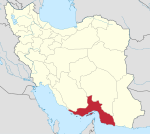Gulashkird

Gulashkird also known as Faryjab or Paryjab or Valashgird[1] was an important town in Kerman Province of Iran during the Middle Ages as a station on the trade routes from The Persian Gulf and Persia to India and also into Central Asia.[2]
Today the town lies at modern Faryjab, a small village north east of Bandar Abbas, south of Jiroft and 50 km north of Mantijan, near the town of Manujan and the Rudkhanah i Duzdi River.
Historically the town was a strongly fortified town with a castle known as Kftshah and was serviced by quanats that allowed the area to grow Indigo,[3] Oranges, Date Palms[4] and Grain,[5] It was mentioned by Arab geographers Mukaddasi and Yaqut al-Hamawi[6] and Marco Polo.[7][8]
The village has been suggested[9] as a possible location for the lost city of Alexandria Carmania, founded by Alexander the Great months before he died in Babylon.[10] Indeed, Greek pottery has been found in the area.[11]
References
- ^ Lewis Vance Cummings, Alexander the Great (Grove Press, 2004)page 402.
- ^ E. H. Warmington, The Commerce Between the Roman Empire and India (CUP Archive, 2014) page 24.
- ^ Lands of the Eastern Caliphate Archived 2015-06-19 at the Wayback Machine.
- ^ Guy Le Strange, The Lands of the Eastern Caliphate: Mesopotamia, Persia, and Central Asia from the Moslem Conquest to the Time of Timur (Cosimo, Inc., 2010)page 318.
- ^ E. Yarshater, The Cambridge History of Iran: Seleucid Parthian (Cambridge University Press, 1983) pazge 173.
- ^ Yakut (iv, 939)
- ^ Travels of Marco Polo Vol2.
- ^ The travels of Marco Polo vol 1, chapter16.
- ^ G. Le Strange, The Lands of the Eastern Caliphate, Cambridge University Press 2011. page 317
- ^ Lewis Vance Cummings, Alexander the Great (Grove Press, 2004)page 402 p402
- ^ Sir Percy Molesworth Sykes, A History of Exploration from the Earliest Times to the Present Day, Taylor & Francis, 1949

